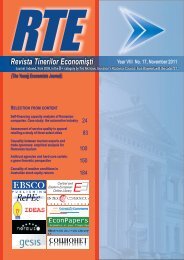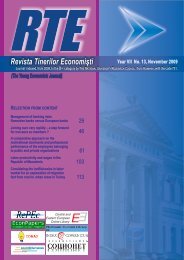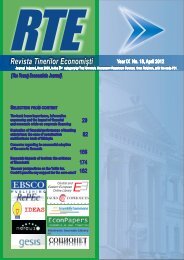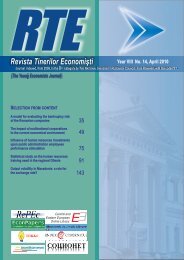Implications of change management in public administration
Implications of change management in public administration
Implications of change management in public administration
Create successful ePaper yourself
Turn your PDF publications into a flip-book with our unique Google optimized e-Paper software.
Bus<strong>in</strong>ess Statistics – Economic Informatics<br />
Albanian specialists and national and <strong>in</strong>ternational <strong>in</strong>stitutions <strong>in</strong> the filed <strong>of</strong><br />
restructur<strong>in</strong>g and privatization & concessions. Albanian authorities are <strong>in</strong> the<br />
process <strong>of</strong> evaluat<strong>in</strong>g some expressions <strong>of</strong> <strong>in</strong>terest <strong>in</strong> reach<strong>in</strong>g a concession<br />
agreement by foreign companies but this has to be carefully developed. We<br />
need to f<strong>in</strong>d a balance between our obligations to the European Community<br />
standards and our need to accelerate <strong>in</strong>vestment <strong>in</strong> the railway <strong>in</strong>frastructure. It<br />
is stressed out that, without aggressive trade and transport facilitation, the<br />
reform <strong>of</strong>, and <strong>in</strong>vestments <strong>in</strong>, the transportation sector and the setup <strong>of</strong><br />
logistical and distribution centers can br<strong>in</strong>g only limited results. On the other<br />
hand, the improvement <strong>of</strong> overall performance <strong>of</strong> transport sector, besides<br />
restructur<strong>in</strong>g, privatization and concessions, needs also, staff reduction, because<br />
state owned companies are seen as entities with much higher social<br />
responsibilities. Reform challenges not only <strong>in</strong> Albania, but throughout the<br />
region, <strong>in</strong>clude overstaff<strong>in</strong>g, high costs and a lack <strong>of</strong> modern <strong>management</strong><br />
2. Background: the transport sector situation & demand for <strong>change</strong>s<br />
Despite the difficulties that Albania has faced dur<strong>in</strong>g years, it has achieved<br />
significant progress and impressive economic growth. GDP grew <strong>in</strong> average by about 7<br />
percent dur<strong>in</strong>g the period 1996-2009, while GDP per capita <strong>in</strong>creased from $2,619 <strong>in</strong><br />
2005 to over $ 3200 <strong>in</strong> 2008. While these accomplishments are impressive, Albania<br />
still rema<strong>in</strong>s one <strong>of</strong> the countries, which is cop<strong>in</strong>g with serious challenges. Transport<br />
sector development is one <strong>of</strong> critical challenges for several reasons, among them are:<br />
First, <strong>in</strong> a broader po<strong>in</strong>t <strong>of</strong> view, Albanian geographic position gives it a<br />
potentially important role <strong>in</strong> the movement <strong>of</strong> trade between Southern Europe,<br />
Greece and countries <strong>of</strong> the Balkans (SEE). Albania is traversed by both the TEN<br />
Corridor VIII, cross<strong>in</strong>g from the port <strong>of</strong> Durres to the port <strong>of</strong> Varna <strong>in</strong> Bulgaria,<br />
and other key routes as part <strong>of</strong> the SEE “Core network”. The new motorway to<br />
Kosovo, opened <strong>in</strong> June 2009, will br<strong>in</strong>g about step <strong>change</strong>s <strong>in</strong> the time and user<br />
costs <strong>of</strong> traffic between the Port <strong>of</strong> Durres and Kosovo, and will potentially form<br />
the shortest route between Adriatic and Corridor X.<br />
Second, while there is a large potential benefit for the country, Albania still lags<br />
beh<strong>in</strong>d <strong>in</strong> terms <strong>of</strong> trade logistic environment <strong>in</strong> the region and Europe. The World<br />
bank Report <strong>of</strong> 2007 ranks Albania 139 out <strong>of</strong> a total <strong>of</strong> 150 countries on the basis<br />
<strong>of</strong> the calculated Logistic performance <strong>in</strong>dex fall<strong>in</strong>g significantly below<br />
expectations compared to its PPP <strong>in</strong>come level, and reflect<strong>in</strong>g comparative<br />
weakness, <strong>in</strong>clud<strong>in</strong>g among others, the quality <strong>of</strong> transport and Information<br />
Technology for logistics, ease and cost <strong>of</strong> <strong>in</strong>ternational shipments etc.<br />
Third, the accelerated development <strong>of</strong> the country with multiple objectives (to<br />
improve the standard <strong>of</strong> liv<strong>in</strong>g and be<strong>in</strong>g a member <strong>of</strong> European family with<strong>in</strong> a<br />
relatively short time), needs radical improvements <strong>in</strong> the transport sector.<br />
Fourth, Among the critical challenges for a susta<strong>in</strong>able development from the<br />
<strong>in</strong>ternational <strong>in</strong>stitutions, it is said at EBRD report 2006: “<strong>in</strong>frastructure<br />
improvements, <strong>in</strong>clud<strong>in</strong>g upgrades <strong>of</strong> the road system, modernization and<br />
expansion <strong>of</strong> seaports and regional airports, progress <strong>in</strong> restructur<strong>in</strong>g and<br />
privatization <strong>of</strong> utilities to ensure reliable services….”.<br />
149















